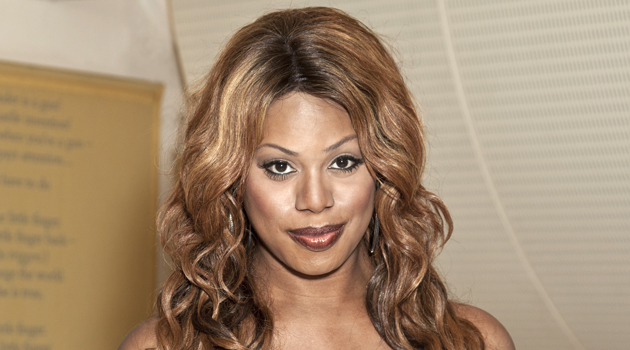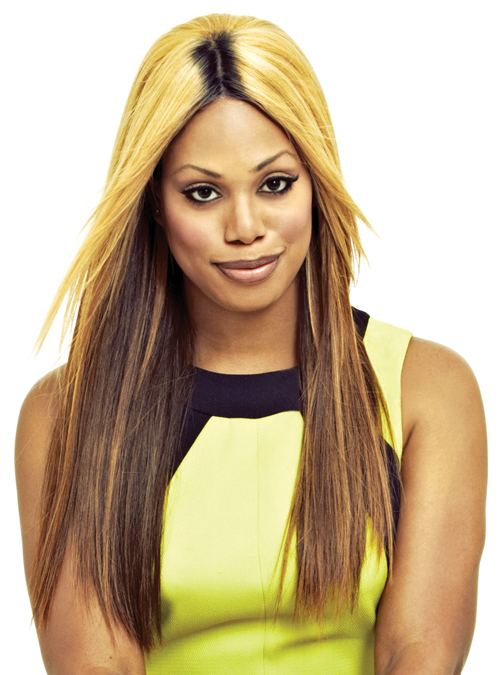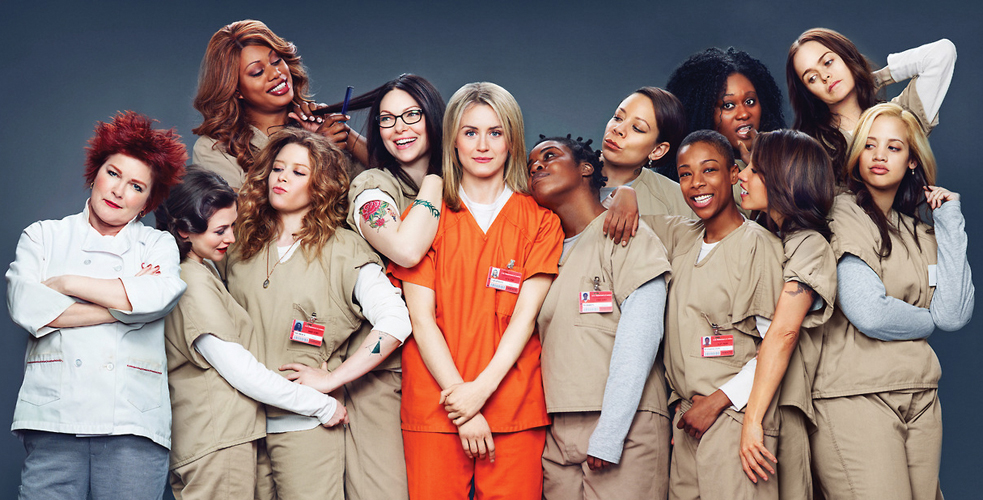
Standing Tall

‘Orange Is the New Black’ star and Creating Change keynote speaker Laverne Cox speaks to OutSmart
by David Goldberg
Though House of Cards was intended to be Netflix’s most prestigious original debut, its true triumph is Orange Is the New Black (OITNB), Jenji Kohan’s smash about a women’s prison in Upstate New York, loosely based on the memoir by Piper Kerman. The series features an astonishing cast of women of different ages, sizes, and races, all of whom have their own stories, opinions, and hardships. • Standing tall among the feminist commune is trans actress Laverne Cox, who plays Sophia, a trans inmate who seeks to find stability and grace in an unstable and often unwelcoming world. Cox—who will be in Houston this month as keynote speaker for the National Conference on LGBT Equality: Creating Change 2014—spoke with OutSmart about her character, her sudden celebrity, and her role as a public trans figure. Click here for information on Creating Change.
David Goldberg: I’ve spoken with actors who play trans characters who feel the need to be involved in the costume and development process just to ensure that the character is portrayed right. Do you feel like you are under pressure to make sure that a trans character is portrayed perfectly, or do you have to just trust the creators?
Laverne Cox: I don’t, if there’s any such thing as “perfectly” when it comes to a character. What I’ve always been fascinated by is characters who are flawed. When we got into [Sophia’s flashback episode], I was able to meet and discuss with [director] Jodie Foster beforehand. In TV, it’s all about the writers and what the writers want. I didn’t really have any feedback with Sophia in terms of how the character was constructed and written. She came to me this way and it was my job to breathe life into the words. As an actor, it’s important for me to go in and do the job. I’ll push back on certain things when I feel they’re problematic for me, and then I have to let it go. I’ve chosen not to do a lot of roles because they were offensive. I pick my battles. It’s really important for me for people to want to work with me. I don’t want a reputation for being too politicized.
I remember this interview I saw between Natalie Portman and Ellen DeGeneres, back when Natalie was in the Star Wars movies. They showed a clip, and she admitted that they filmed pretty much the whole movie in front of a green screen and that she didn’t know what was really happening in the acting process. With editing, it must be so scary to be an actor, because you don’t really know what’s going to happen with your performance once it is out.
I think it’s about trusting the folks you are working with, trusting their intentions. I’m very lucky on OITNB to be working with top professionals. If you’re not trusting the people you’re working with, you probably shouldn’t be working with them. As an actor, you need your job and you need to work. I had a restaurant job until May. I kept my day job for a long time while I was doing several independent films and several TV shows. It’s a hard business, but you have to give yourself over…until you’re Meryl, and then you can probably push back more. Meryl probably has a lot more say than I might have about her characters.

How much of Sophia’s backstory do you know? Do you have a timeline for when she started taking on feminine mannerisms? Are you aware of her gender development?
I feel like Sophia was someone who was always feminine but who tried to be butch. I was never that trans woman. I was never able to be butch before I transitioned. But Sophia was a good actor. She was able to convince people that she could be a male firefighter. I think that it is really important to remember that she was a hero before she transitioned—she saved lives. The writers were very smart to integrate that into her story.
Does it matter that Sophia is played by an actual trans person?
The fact that they wanted to hire someone who is actually trans for the role is really fantastic. Trans actors should be able to work in the business. It’s made such a difference for the viewers to see a trans person in their homes. It think it worked out pretty well. The world hasn’t ended because a trans person is playing a trans person. It’s quite the opposite.
Is the problem that measly amount of trans parts are going to non-trans actors or that there aren’t enough trans parts for everyone?
This is such a complicated issue for me. I love actors, and if I were a cisgender actor, I’d want to play a trans part. Unfortunately, the industry wants cisgender actors to play trans, but they’re not always cool with hiring trans actors to play cisgender characters.
We need more trans stories. The problem is that so often people don’t know how to write them. There are no trans writers on OITNB, but they’ve written this really human character who has hopes and dreams and pain and mistakes. They did a great job of humanizing Sophia, but then there are such wonderful things about trans storytelling that people don’t know. People don’t know our stories. It’s important that trans people have the means of production so that we can write and show our own stories. We can hire trans actors to play roles that weren’t originally written for trans actors.
We talk about colorblind acting, but what does genderblind casting mean? How do we begin to open up this space in which if an actor is talented, we just hire them? With workplace dramas or comedies, trans folks aren’t hired enough. A trans person can be on The Office or work in that milieu. We work in offices and hospitals. There are tons of trans lawyers. There are shows where trans actors can play lawyers at the firm or doctors at the hospital. It’s not on people’s radar, but hopefully that will begin to change.
Is Sophia a “moment” in 2013?
It’s certainly been a moment for me. Time magazine called Sophia the fourth most influential character of 2013, and they cited a couple of trans shows that have been greenlit. The show has changed my life. I’m getting used to that. It’s been four or five months since our show premiered, and everything’s different.
But I’ve lived in New York City for a really long time, and before this show, I used to get recognized from other shows I’ve done. I’m 5’11”, I’m really tall, and people have always noticed me. That’s not always positive. I would often walk down the street, and people would call me a man. I would not feel safe. So, five months into the success of this show, the attention I’m getting on the street still makes me feel unsafe. It is still scary to have a stranger touch me—it’s emotional, because I know that fans of the show are coming to me with so much love, but I have a lot of trauma. I am still programmed to be like, “I’m on the streets of New York, I need to move quickly, and I need to be really careful, or I may be killed today.” I don’t want to get too comfortable in thinking that because I’m a celebrity now, I’m safe, because it’s not safe for girls like us on the street.
I interviewed CeCe McDonald a few weeks ago. She’s an African-American transgender woman who is serving a 41-month prison sentence in St. Cloud, Minnesota, for defending herself from racist and transphobic attackers in 2011. She’s a victim of a hate crime, and she’s in jail. What was so moving to me after speaking to CeCe was her spirit. She has been serving time in a men’s prison as a trans woman—but she has such a sense of spirituality and hope and positivity and such profound humanity in this system that wants to dehumanize her and misgender her. We’re doing a documentary on CeCe and the issues that surround her case—particularly violence against trans women. It’s called Free CeCe. You can support it online at http://fiscal.ifp.org/project.cfm/655/.
What is an action that any person could take to support the movement?
There are organizations that have an intersectional approach on looking at trans violence that need help to fund their work. But it’s not just about money. There are a lot of grassroots activists who need support and who need resources. Change happens when people talk to their family members about who trans people are. We need education. We need Gender 101. Colleges and universities need to do better work with educating people around gender. We should start earlier, because kids are not going to be so judgmental of it. Take it out on the road.
You’ve done so much press over the last few months. Is there one question or theme that you keep getting asked that bothers or offends you?
I used to get a lot of surgery questions, which I don’t answer. I’ve gotten transition questions only twice on this go-around, which I’m amazed by. I’ve chosen not to talk about the specific details of my medical transition publicly, because for the past 60 years we’ve made trans identity about transition and surgery, and it’s so much more than that. By focusing on transition and surgery, we objectify trans people, and we don’t focus on the fact that trans people are facing all kinds of injustices in this culture. We don’t really delve into the fact that so many of us are being murdered on the streets, or our joblessness rate, or the discrimination we receive in housing and education across the board. There’s been a shift in the type of questions I get asked. But at an earlier point in my life, the first question I would get would be about what my surgical status was.
With a cisgender person, we make assumptions about their bodies, and with trans people we can’t make those assumptions, and that creates anxiety. There’s so much emphasis placed on bodies and genitalia that it’s fundamentally dehumanizing personally. There is so much work that has to be done in terms of how our stories need to be told. We are more than our bodies, and gender is about more than genitals. My womanhood is a spiritual thing. It’s a spiritual journey for so many of us. It really has been for me. This is about setting my spirit free and letting my female spirit exist openly in the world. It transcends medical intervention. It’s a spiritual intervention.
Who are OITNB fans? What is your demographic?
The other show I was majorly recognized for was I Want to Work for Diddy. It was a black show. That was a pretty solid demographic of black women, black queer folks, and some black straight men who loved me. With Orange, it’s everybody. I have bourgeois white women, straight white men, Latinos, Middle Easterners, blacks, whites—everybody. Black girls [who work] in Starbucks bring me free stuff. When I was addicted to cake pops, I was going in every day. I’m not doing that anymore. It’s really everybody. It’s intergenerational. I met a grandmother, her daughter, and her granddaughter, and they all watch the show together. It’s a testament to how diverse our show is. I love our fans. They’re so dedicated and so amazing and so beautifully diverse. It’s what America looks like.
What has it been like to return to the set after such a huge response to the first season?
There is so much love, and we are all so excited, and a lot of the actors on the show haven’t had an opportunity like this. I think we’re all excited to have such rich characters to play. There’s so much gratitude that we all have, and we love what we do. Jenji [Kohan] and our executive producer Lisa Vinnecour create such an amazing environment on set. It’s mostly a female crew, so it’s this incredible vibe, and it’s been that way from the start. We’re really happy for each other’s success. It’s just beautiful.
If you could go back at any point in your path, would you give yourself any advice? Would you change anything?
I wouldn’t change a thing, and that’s real. I try not to frame anything I do as a mistake. I try to frame it as a lesson. If I would give my younger self some advice, I’d say, “Don’t be so hard on yourself. You are lovely and smart and beautiful, and don’t say those things about yourself, because they’re not true.” I internalized the voices of my bullies and took them on as my own voice. Everything has happened to get me to this place. Non, je ne regrette rien, as Edith Piaf would say.
I can’t think of a black trans woman who has had this kind of platform, so I’m going to say what I get to say for as long as people let me say it. And then I’m going to keep saying it. In reality, I’ve been saying it for years, and only now are people noticing.
David Goldberg wrote about American Horror Story: Coven in the December issue of OutSmart magazine.










